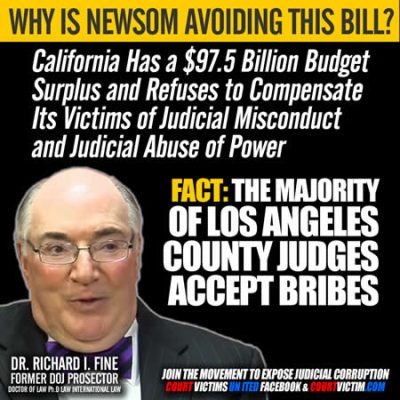Dr. Richard I. Fine

Who is Dr. Richard I. Fine? Richard I. Fine, (Doctor of Law; Ph.D Law-International Law). He is a patriot and lawyer (presently qualified to practice before the United States Supreme Court). He was disbarred from California and “unlawfully incarcerated in solitary coercive confinement without charges being made” for 18 months in the Los Angeles County jail in retaliation for exposing (Dishonorable) Judge David Paul Yafee #29399 and all of the Los Angeles County Superior court judges for accepting unlawful payments/bribes from the county. These payments resulted in literally no one winning a case against the county when a judge made the decision. Dr. Richard I. Fine FULL BIO His Amend SBX 2 11 Legislation that can stop judges from getting away with legally accepting bribes (from tax payer’s funds) awarded by those in charge Dr. Richard I. Fine Videos Richard I. FINE – part 1 Richard Fine, a Champion for Justice, Part 1 Why Won’t the ACLU Help Jailed Attorney Richard Fine? #556 Trailer Interview: Richard Fine with Bill Windsor of Lawless America Family Law Report – Richard Fine Part 2: Miscarriage of Justice & Abuse of Power Richard Fine Knocks Off Another Judge #VB98 Richard Fine: His Darkest Moment in the LA County Jail #580-581 Trailer Richard FINE reveals HOW to fight Corrupt Judges The Imprisonment of Attorney Richard I. Fine Attorney Jailed Denied Rights for Exposing Judicial Corruption, Richard Fine California Richard Fine Teaches the Public How to Fight Corruption (5 of 5) National Safe Child Show-Richard Fine-Attorney Disbarred for Exposing Corruption in the Courts Richard Fine, an Anti-Corruption Champion, Part 1 of 2 Richard Fine, an Anti-Corruption Champion, Part 2 of 2 Free Richard I. Fine! Family Law Report – Richard Fine Part 1: Judicial Bribery &… Read More



